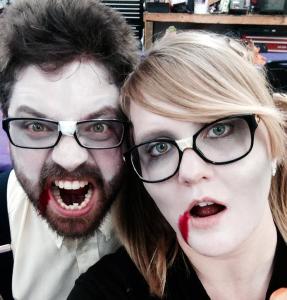
As I mentioned in my first post in this series, vampirism is diametrically opposed to everything God calls good in his Word. But in light of this distinct separation, how would a vampire who got saved navigate the vast chasm between his old existence and his newfound faith? Read on to find out my thoughts on the matter and to get a glimpse at some of the questions I considered when writing my debut novel, Blood for Blood.
You might be a vampire if…

Special thanks to my friends Brian and Sarah for letting me use this pic.
Check out Brian’s blog at http://created-to-worship.blogspot.com.
…you’re undead?
“A vampire.” Vanessa rolled her eyes and sighed. “Don’t tell me you don’t know what a vampire is.”
“Look, I don’t know anything about what’s going on here. All I know is that I found you last night, we—you attacked me, and then I woke up tonight in a coffin.” Raven stepped toward her, his fists clenched. “What did you do to me?”
She matched his step with one of her own. “I have granted your greatest desire.”
Hurt? Pain? Violence? Excommunication from his family? A murderous thirst for human blood? He didn’t desire any of those things. “Which is what?”
“It’s the same thing every man wants: immortality.”
Not only was she dangerous—she was a lunatic too. “You’re not making any sense.”
“You died last night, Raven. I know. I killed you.”
“What?” Raven tensed his jaw. “You—”
Vanessa held up her hand. “Tonight you were reborn, a new creation. You’re neither living nor dead, but undead.”
– Excerpted from Chapter 28 of Blood for Blood, by Ben Wolf
Vampires die before they become vampires, yet they’re able to walk around and do a lot of the same things that normal, living people can do, plus a few extra things. They are “undead,” a term first adapted by Bram Stoker, the author of Dracula.
Yet long before that, in the Bible, we see examples of the “undead.” Arguably the first mention of something undead was when God showed Ezekiel (in Chapter 37 of the book named after him) the vision (we’re assuming it was a vision) of the dry bones in the valley rattling together, regrowing tendons and flesh and eventually getting filled with the breath of life from God. It’s a short passage, so you should check it out sometime.
While that’s cool, it sort of supports the possibility of undead things being real and of God, but I’m arguing that vampires definitely aren’t of God. If God does it, then it’s of God (obviously), but vampires are a total corruption of the salvation message, so they don’t fit the bill.
Here’s what I mean: vampirism opposes salvation through Jesus Christ as a viable alternative. Yet, as with all of the Devil’s promises (and I can say that because in a lot of folklore vampires are believed to be demons or demonic creatures more than they are people), vampirism fails to deliver true salvation. (You can read a lot more about that in the final installment of this blog.)
Let’s turn to Scripture again. Whereas vampirism involves a delay in eternal judgment, this verse suggests that only Christ offers true salvation, and that those who die once will in fact face said judgment:
And as it is appointed for men to die once, but after this the judgment, so Christ was offered once to bear the sins of many. To those who eagerly wait for Him He will appear a second time, apart from sin, for salvation. (Hebrews 9:27-28, NKJV)
What’s more, vampirism only offers a temporary solution to mortal death, as vampires can be killed with stakes (link to #8) or by sunlight. Vampirism mirrors Christ’s resurrection after his death. He rose from the dead and completed the work God sent him here to do in atoning for our sins.
Vampires awaken from the dead as well, but it’s a corruption of real life. It’s artificial, as they require the blood of others to survive. They rise from their graves nightly as abominations of darkness and they haunt and harm others, often turning their victims into vampires as well (evangelism, anyone?).
Anything short of forgiveness of a person’s sins through Jesus’ sacrifice is a lie at best and a curse at worst. So the question then becomes, can a vampire, who has opposed Christ just by existing, come to Him and receive forgiveness? What do you think? Share in the comments below, would you? Don’t forget to click on the cover of Blood for Blood to get your copy today.

